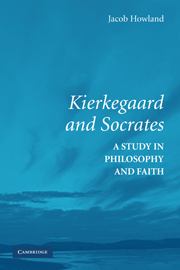Book contents
- Frontmatter
- Contents
- Note on Texts and Translations
- Acknowledgments
- Kierkegaard and Socrates
- Introduction
- 1 Johannes Climacus, Socratic Philosopher
- 2 Climacus's Thought-Project
- 3 Platonic Interlude: Eros and the God
- 4 Climacus's Poetical Venture
- 5 The Paradox and the Passion of Thought
- 6 Self-Love and Offense
- 7 Faith and the Contemporary Follower
- 8 Climacan Interlude: On Historical Necessity
- 9 The Follower at Second Hand and The Moral
- 10 Socrates in Postscript
- Epilogue: Kierkegaard on Christ and Socrates
- Works Cited
- Index
8 - Climacan Interlude: On Historical Necessity
Published online by Cambridge University Press: 01 December 2009
- Frontmatter
- Contents
- Note on Texts and Translations
- Acknowledgments
- Kierkegaard and Socrates
- Introduction
- 1 Johannes Climacus, Socratic Philosopher
- 2 Climacus's Thought-Project
- 3 Platonic Interlude: Eros and the God
- 4 Climacus's Poetical Venture
- 5 The Paradox and the Passion of Thought
- 6 Self-Love and Offense
- 7 Faith and the Contemporary Follower
- 8 Climacan Interlude: On Historical Necessity
- 9 The Follower at Second Hand and The Moral
- 10 Socrates in Postscript
- Epilogue: Kierkegaard on Christ and Socrates
- Works Cited
- Index
Summary
Having discussed the situation of the contemporary follower in Chapter Four, Climacus will go on to examine that of the follower at second hand in Chapter Five. The two kinds of follower, of course, are necessarily separated by a period of time. “How long the intervening period should be is up to you,” Climacus remarks to the reader, “but if it pleases you, then for the sake of earnestness and jest we shall assume that precisely eighteen hundred and forty-three years have passed.” Not coincidentally, this is almost exactly how much time has elapsed between the incarnation of God in the person of Christ and the publication of Fragments. But this puts Climacus in a literary predicament: how is he to “suggest” this passage of time? His solution is to employ, after the fashion of comic dramas, a light entertainment or “Interlude.” In a comedy, he observes, “there may be an interval of several years between two acts,” during which “the orchestra sometimes plays a symphony or something similar in order to shorten the time by filling it up.” Instead of offering us music, however, Climacus proposes to fill the time between Chapter Four and Chapter Five by examining a certain philosophical question. What is more, the question, which furnishes the subtitle of the Interlude, is to all appearances a serious one: “Is the Past More Necessary than the Future? Or Has the Possible, by Having Become Actual, Become More Necessary than It Was?” (72).
- Type
- Chapter
- Information
- Kierkegaard and SocratesA Study in Philosophy and Faith, pp. 157 - 172Publisher: Cambridge University PressPrint publication year: 2006

